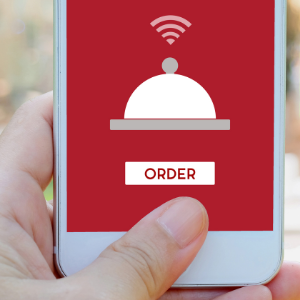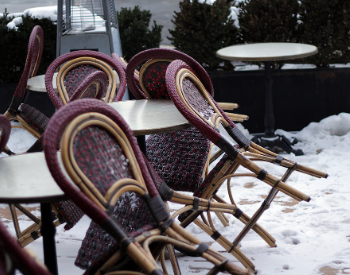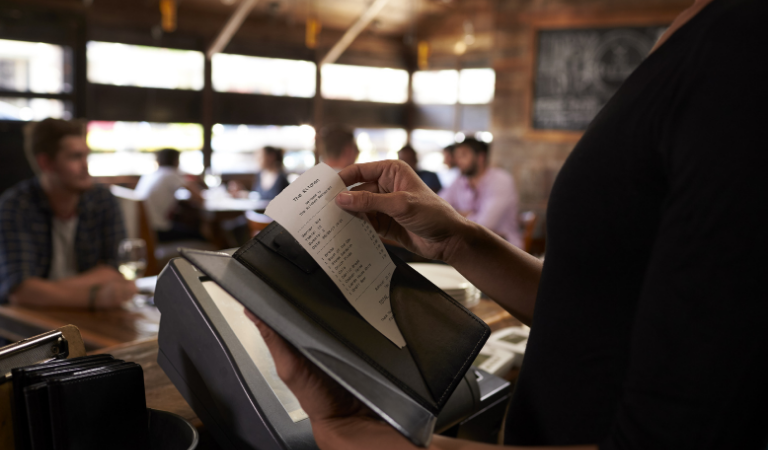Stats Of The Week
The State Of The Industry
A new report predicts that next year the U.S. restaurant industry will turn from a negative to a stable industry, according to an updated Moody’s report emailed to Restaurant Dive. The report credits the status change to loosened capacity restrictions and consumers feeling more comfortable dining out in the next 12 to 18 months. Though the change is predicted to be slow, the report expects profits to rise by about 15% in 2021. Quick-service restaurants are projected to outperform casual dining restaurants with drive-thru and mobile ordering driving sales. This year, profits have fallen by more than 30% and the news of a stable status is unexpectedly welcomed news to an industry that has been struggling to stay afloat for the majority of the year.
Restaurants Rely On Third-Party Apps During The Pandemic

As COVID-19 cases continue to fluctuate throughout the year, restaurants have turned to third-party food delivery apps to increase their off-premise operations. Nearly 40% of restaurant operators said they would not have been able to stay in business during the pandemic without their third-party delivery partnerships, according to a new study by Raydiant. 28.8% of respondents say those apps now make up between 21% to 30% of their sales. Though restaurants have become dependent on third-party apps, many have criticized these services for charging high fees and using untrustworthy tactics. The survey shows that 58% of respondents trusted DoorDash most of all food delivery apps with 18% trusting in Grubhub and 17% in Uber Eats.
What’s Trending
States Begin Pausing Or Reversing Restaurant Reopening Plans
San Francisco had planned to increase restaurant capacities from 25% to 50% on November 3, but that has been put on hold indefinitely due to the recent rise in positive COVID-19 cases. Los Angeles health officials cited the decision due to finding that 10% to 15% of cases in the county were tied to a dining experience. LA county only offers outdoor dining but neighboring counties do allow indoor dining at limited capacities. Chicago has also halted indoor dining and bar services after previously raising capacity to 40%. New York City has begun reducing or even shutting down indoor dining in some neighborhoods to prevent the spread of the virus. Colorado, Idaho, New Mexico, and Massachusetts are included in the number of states reversing original reopening plans.
A Ghost Food Hall Could Be The Dining Experience Of The Future
After the first weekend of restaurant closures in Washington D.C, restaurateur Aaron Gordon pivoted his operations to only take out and delivery and brought in 80% in sales. Gordon thought this was a fluke and told Restaurant Dive that he was sure he was going to be in big trouble the following weeks. Thanks to his supportive customers and neighbors, the following weekend his sales were 90% of what they were in 2019, the next weekend he reached 100% of sales and even reached 105% the next weekend. Gordon then thought to invest in an available 2,000-square-foot former bar and turn it into a ghost kitchen food hall. Six months later, he opened Ghostline with six restaurant vendors that offer outdoor patio seating and food for take out or delivery.
Gordon did not find it hard to find chefs to partner with as many were looking for ways to keep their business afloat. The Ghostline model also alleviated third-party commission fees that were weighing down many restaurants and launched its own delivery program. The ghost food hall has seen much success and is even considering adding additional menus for guests. "This idea is really nice because we’re prepared both to [outlast] a two-to-four-year pandemic if need be, but we’re also in a pretty good place [with] our patio. So pandemic or no pandemic, we’re offering something for everyone," Gordon said to Restaurant Dive.
Restaurants Plan To Winterize Their Establishments, But At What Cost? 
While many states are suspending restaurant reopening plans, restaurants are planning ways to keep their outdoor dining services open despite a looming winter. Coronavirus cases have been spiking across the country and outdoor dining will become even more important as indoor capacities become more limited. A survey of 400 restaurants found that 50% of participants are planning to invest in winterizing their outdoor areas in the coming months, according to Rewards Network. The majority of respondents believe diners will be “very” or “somewhat” willing to dine outdoors during winter. Many restaurants are weighing their chances of survival as winterizing their establishment comes at a cost. Purchasing tents, heat lamps, blankets, and other tools to help keep customers warm brings much for operators to consider while planning for the next few months.
How Restaurants Incorporate Innovate Cleaning Technologies
Once the cleanliness of restaurants became a top priority for customers during the pandemic, operators had to step up their cleaning procedures and sanitation practices to meet the expectation of consumers. This spurred a series of innovative cleaning tools that restaurants have been utilizing for months to keep their establishments safe and sanitary. UVC lights have become popular because the light emitted effectively kills some virus particles and pathogens while being safe for human exposure. Many restaurants have installed these bulbs into their light fixtures to sanitize rooms. Operators are also utilizing hospital-grade disinfectants to wipe down high-touch surfaces and aerosols to kill any bacteria in the air. For outdoor and indoor dining, operators have invested in more fans to help increase air circulation in an effort to reduce the spread of the virus.
“Best-case scenario, we’re out of this mess by next June and if you look at the history of these viruses, we’ve had multiple scares over the past 15 years. This investment was for our employees and communities. Even when the pandemic is over, we’re still going to keep the lights in place for flus or anything else that might come along,” Tom Nye, Blind Horse general manager and winemaker, said to Restaurant Hospitality.
LA Proposes A COVID Fee To Help Restaurants
Last week, Los Angeles county supervisors introduced a “COVID-19 recovery fee” to help restaurants, breweries, and bars. The proposed fee would only be applied to dine-in customers as a surcharge and would not apply to take out and delivery orders. Restaurant owners show mixed feelings about adding additional fees to already wary consumers. Chad Colby, chef and owner of Antico, said to Eater that he doesn’t think raising menu prices is good in this climate because there’s competition to keep prices low, but that restaurants are in dire need of additional assistance. Some operators believe adding a COVID tax will discourage customers from choosing to dine in when they are already hesitant about the health risks. Others see the tax as an opportunity to pay for protective gear and other overhead costs. The Department of Consumer and Business Affairs is looking to see if this idea is practical and will announce their final decision on November 24.
Bright Spots In A COVID-19 World
Local Chef Provides Healthy Meals For Free
The Free Healthy Hot Meals restaurant provides free healthy, soul food for those in need and affected by the pandemic. The restaurant is located in West Garfield Park, a neighborhood in Chicago that has been one of the hardest hit by the pandemic. Many businesses shut down over the summer leaving it difficult for many residents to find healthy and affordable food. Founder Jermaine Jordan funds his establishment through money donated from the restaurant’s GoFundMe page. His team gives away about 600 meals a day and even provides hotel accommodations to those experiencing homelessness who have been infected by the virus and need to isolate. A typical menu at the Free Healthy Hot Meals restaurant includes baked chicken, pot roast, potato salad, fresh veggies, beans, and rice. Twice a week, Jordan cooks barbecue ribs. For dessert, Jordan makes peach cobbler and banana pudding.
App Offers Deal To Help Out Restaurants
The Massachusetts Restaurant Association and a rewards company called Seated are working together to encourage diners to eat out on slow days. The initiative called Eat Out to Help Out MA is a rebate program for customers to make a reservation to participating restaurants every Monday through Wednesday through Seated’s app. Customers will get a 50% rebate on their bill in the form of Seated Rewards that can be redeemed for credit with brands like Amazon and Starbucks. The program is free for restaurants and is intended to give them a boost through usual slow days. 
Quote Of Hope
“All of us are competitors, but we are all in the same boat. And at the end of the day, we all feed people. We’re crazy. This is what we do. We’ve been through the fires and floods and earthquakes. And this community comes together to support each other.” - Ken Frank, chef and owner of La Toque and a Grand Award winner






